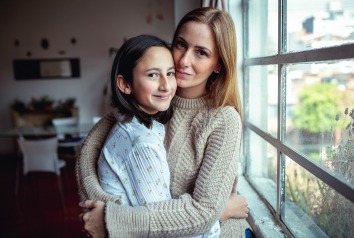 With minute-by-minute news updates and the sudden change in your child’s day-to-day schedule, you are bound to be getting a lot of questions about COVID-19. We’ve gathered some of the best advice from childcare professionals and medical experts to help you navigate the questions and concerns your child might be experiencing.
With minute-by-minute news updates and the sudden change in your child’s day-to-day schedule, you are bound to be getting a lot of questions about COVID-19. We’ve gathered some of the best advice from childcare professionals and medical experts to help you navigate the questions and concerns your child might be experiencing.
PBS Kids featured an article by teacher and parenting educator, Deborah Farmer Kris, about how she approached this conversation with her young kids. She suggests you:
- Share age-appropriate facts and information. The younger your child the simpler your response can be. “You know what it’s like to have a cold or the flu — how sometimes you get a cough or have a fever? This is kind of like that. Most people who catch this sickness stay home, rest and get all better.”
- Reassure your kids that they are safe. “Let them know that right now, lots of amazing grown-ups are working hard to keep people healthy.”
- Emphasize the things your family can do to stay healthy, like practicing good hygiene, getting exercise, and eating healthy.
“Parents need to try and stay calm and practice mindfulness to regulate themselves and their kids.” – Alexis Oberdorfer, CH/LSS
The CDC has also shared helpful tips for talking to your kids in these uncertain times, including:
- Pay attention to what children see or hear on television, radio, or online. “Consider reducing the amount of screen time focused on COVID-19. Too much information on one topic can lead to anxiety.”
- Avoid language that might blame others or lead to stigma. “Remember that viruses can make anyone sick, regardless of a person’s race or ethnicity.”
- Make yourself available to listen and talk and let your children know they can come to you with questions.
 The New York Times spoke with a pediatrician, two psychologists, a pediatric infectious disease specialist, and a safety expert in their recent article about talking to your kids about COVID-19. Here is what the experts had to say:
The New York Times spoke with a pediatrician, two psychologists, a pediatric infectious disease specialist, and a safety expert in their recent article about talking to your kids about COVID-19. Here is what the experts had to say:
- Process your own anxiety first. Make sure “you’re not panicking in their presence around the topic,” said Dunya Poltorak, Ph.D., a pediatric medical psychologist in private practice in Birmingham, Mich. “Your demeanor is going to stir this massive pot of anxiety.”
- Don’t dismiss your child’s fears. “Listen to them and track what the child is feeling,” said clinical psychologist and professor at the University of Minnesota. “You can say something in a calm voice like, ‘That sounds pretty scary, I can see it in your face.’ You can also relay an anecdote from your own childhood about a time when you were scared.”
- Try to enjoy your time together as much as you can. Reframe the current situation as a chance to spend valuable time with your family. “With few distractions, I’m reminded how much I should cherish these moments together,” says Shanghai-based reporter, Rebecca Kanthor.
For more resources about how to talk to your kids about COVID-19, check out the below list of resources:


